By Katie Nash, UNC Health Foundation
While the coronavirus has been devastating for many North Carolinians, underserved communities across the state are feeling an outsized impact from the outbreak. The COVID-19 pandemic has highlighted disparities in access to care and health outcomes across North Carolina and nationwide.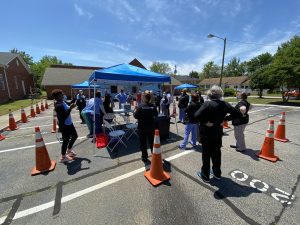
Thanks to the leadership of Population Health Services Manager Randi Towns and her UNC Health Alliance team, in conjunction with support from UNC Physicians Network support, UNC School of Medicine Diversity, Equity and Inclusion, UNC Center for Health Equity Research and UNC Health Marketing and Communications, UNC is meeting underserved populations where they are with much needed care.
With an initial investment from UNC Health Foundation’s COVID-19 Response Fund, the team deployed a UNC Health mobile clinic on May 7 at Martin Street Baptist Church in Raleigh. The clinic is designed to provide COVID testing, education and support services for underrepresented communities with historically limited access to care.
“We started this project as a community engagement effort to address disparities in health outcomes,” Towns said. “We see that COVID-19 is disproportionately affecting minorities, particularly African American and Latinx community members, so as a health care system we decided to deploy mobile testing to their communities.”
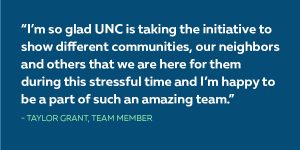 The investment from UNC Health Foundation has covered the cost of the testing, allowing the mobile clinic to provide services at no cost to patients. As of June 18, the clinic has tested 1,306 patients for COVID-19, 185 (14 percent) of whom tested positive. 81 percent of the positive cases have been seen since June 9, with 62 percent of those documenting Spanish as their preferred language.
The investment from UNC Health Foundation has covered the cost of the testing, allowing the mobile clinic to provide services at no cost to patients. As of June 18, the clinic has tested 1,306 patients for COVID-19, 185 (14 percent) of whom tested positive. 81 percent of the positive cases have been seen since June 9, with 62 percent of those documenting Spanish as their preferred language.
“Within two weeks of its conception, the mobile clinic was launched and out rendering care to patients,” said Stephanie Turner, Interim Vice President for Population Health Services for UNC Health Alliance. “Randi and her team were able to identify critical needs through population health data and community leaders, and the entire operation is incredibly well-managed.”
The mobile clinic aims to break down barriers to health care access by holding sessions in convenient locations throughout the community – eliminating the need to travel long distances or find transportation to seek necessary health care. Towns and her team partner closely with local community leaders to determine the most convenient hours and locations that would be ideal to set up the clinic.
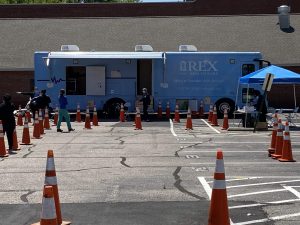 “To really engage our target population, we have to connect with the community on a deeper level by forming relationships with those that they know and trust,” Towns said. “We depend on these community leaders to promote our services and reach those who need it the most. We often see that many in these communities don’t interact with health care systems because of mistrust and inequity. We may be many of these people’s first touch point with health care and we have to really value that. We have to do our due service and say, ‘You’re so much more than a patient – you’re a person. And we’re going to treat you like a person.’”
“To really engage our target population, we have to connect with the community on a deeper level by forming relationships with those that they know and trust,” Towns said. “We depend on these community leaders to promote our services and reach those who need it the most. We often see that many in these communities don’t interact with health care systems because of mistrust and inequity. We may be many of these people’s first touch point with health care and we have to really value that. We have to do our due service and say, ‘You’re so much more than a patient – you’re a person. And we’re going to treat you like a person.’”
Promotion has been leveraged through partner organizations and community leaders such as the Southeast Raleigh YMCA, Southeast Raleigh Promise, El Centro Hispano, El Pueblo, Wake County Economic Development and various local churches. The clinic also partners with health care providers in the area that are not able to offer testing to their patients, including Alliance Medical Ministry, NeighborHealth and Urban Ministries Open Door Clinic.
“Community leaders from the African American and Latinx populations ask questions to make sure we are meeting the unique needs of these groups,” Towns said. “For our Latinx community members we discuss bilingual staff – if we can’t have someone on site, how will patients respond to electronic translation? In today’s climate, we also ask the question of whether we will have police on site – we have a lot of direct, helpful and tough conversations.”
Towns said that delivering a program that not only meets the testing needs but also the emotional needs of the community is critical to closing the gap in health outcomes.
“When we start every session we have a huddle where I say ‘Our core values are respect and compassion.’ If we can say with every patient interaction, whether it’s saying hello or listening to their concerns, that we’ve acted with compassion and respect, then we’ve done our job.”
On June 5, in collaboration with the Orange County Health Department, the mobile clinic held its first testing site outside of Southeast Raleigh. UNC Health is currently evaluating the capability to expand the mobile clinic into other underserved areas, especially in rural parts of North Carolina.
“We have a commitment to Southeast Raleigh because it is an underserved location right in our own backyard, but we also recognize the need for this in other areas,” Towns said. “We know we can’t be all things to all people, so we are always working to determine how we can have the most impact”
UNC Health holds sessions with the mobile clinic three days per week, with a target of seeing approximately 100 patients per day. When a patient arrives at the clinic, they receive a health assessment so providers can better understand the patient’s COVID-19 exposure history and symptoms. Every patient receives a COVID-19 test, and those who test positive receive a phone call within 48 hours with their results and a follow-up call every day after that for 10 days to ensure that their symptoms are not worsening.
“A lot of the patients that we see do not have primary care, and if they were to go get tested by the state or elsewhere, they would not receive this comprehensive follow-up,” Towns said.
Testing positive means having to self-isolate for several weeks, which can lead to additional concerns. Food insecurity can quickly turn a quarantine into an unsettling situation. Nurses and staff on site at the mobile clinic speak with each patient to ensure their basic needs are met and put them in contact with local food pantries and shelters if necessary.
“We always ask patients if they have food, if they have financial issues, if they have medications,” Towns said. “We are able to provide resources to meet those needs if they have them.”
The mobile clinic also houses educational services to help manage life during the pandemic. Resources include coloring books for children that explain COVID-19, tips for how to talk to children about the virus, what to do if an employer does not take proper virus precautions and information on how workers can protect themselves. The clinic also provides homemade face masks to every visitor, with more than 1,000 provided so far. Visitors may also take additional masks for family members in need.
A pivotal part of the services provided outside of testing is access to behavioral health support. In a time of high stress and anxiety, many patients may need additional conversations to process their mental health struggles. If a patient demonstrates a need for this type of support, providers at the mobile clinic make a referral and the patient receives a call the same day to have a virtual appointment with a mental health professional.
“When we originally got together and were working to understand why these communities were underserved and why COVID-19 is disproportionately affecting minority populations, we knew that it wouldn’t be enough to provide testing alone,” Towns said. “We’ve been really intentional to try to build as much of a holistic project as possible, asking ourselves ‘What is the most we can do and provide?’”
Towns said it has been inspiring to see the collaborative effort of UNC Health colleagues and clinics across the Triangle, as well as the gratitude of the patients who come to the mobile clinic.
“Patients are so appreciative – it’s mind-blowing,” Towns said. “It really speaks to the heart of why we’re doing what we’re doing. It’s also great to be able to offer our coworkers the opportunity to serve their own community and neighbors and to give back.”
For Turner, the added benefit of connecting with patients in an environment that is familiar and comfortable proves crucial to delivering the highest quality care.
“As a nurse practitioner, seeing these patients receive care in their natural space, in their own community, is incredibly valuable,” Turner said. “It reveals more that allows providers to better support care – information you would not discover when patients come in to the office at their very best. If we don’t take our assessment out to physically meet them where they are, what are we missing?”
Turner sees the mobile clinic’s value not only in today’s conditions, but as a long-term asset for the communities it serves.
“It’s COVID-19 testing today, but it could be flu vaccination or preventative health services in the future. There is so much potential even beyond the pandemic.”
The benefits have been significant already, and not just for patients. Towns said that the feeling of doing work that has a true impact on communities in need is special, a sentiment that echoes throughout her team.
“Passion is infectious. Every new staff member or volunteer just feels the passion and the excitement of the team, and when they leave they’re asking when they can come back. It really gets to the true heart of health care and the impact that it has on not only job satisfaction but personal fulfillment.”
For more information about how to support UNC Health’s mobile clinic, please contact Martin Baucom at martin_baucom@med.unc.edu.
Click here to make a gift to UNC Health Foundation’s COVID-19 Response Fund.
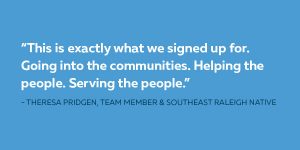
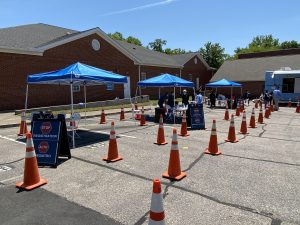
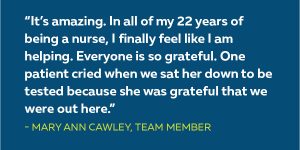
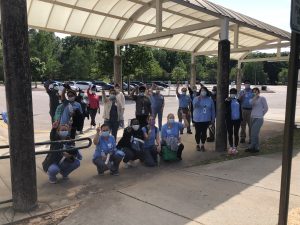
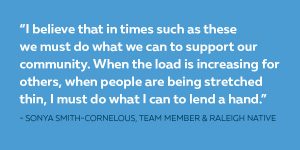
6 Responses to “UNC Health Mobile Clinic Goes Beyond COVID-19 Testing”
Marcia
Randi Towns, what an awesome intervention! This is helping to close the gap, on the health disparities many African Americans and minorities face.
Theresa Pridgen
Serving our communities while performing COVID-19 testing has been the most rewarding experience since I began working in the healthcare field. Everyone from the staff to the team leaders are the best group of people I have worked with! Randi is a leader’s leader…personable, encouraging and always positive! I am saddened that I’m unable to work with these wonderful people because I was called back into the office. You guys rock!
Victor Reiss
Randi and UNC team – thanks for mobilizing quickly and bringing care to underserved communities. I also want to say thanks to the UNC Health Foundation, lour community partners, and Board members that made this possible. You are an inspiration and continue to lead the way!
Cynthia Ward
To know that my co-workers and Randi Towns are out in the community making a difference means a lot to me personally. I am a true Raleigh native (50+yrs) and Southeast Raleigh is were my parents still live and where I was raised. So, I am truly grateful and THANKFUL to the team for working tirelessly at closing the Healthcare GAP within the County. It’s HUGE!!
Tricia DePue
Reading this story has made me feel genuine pride for working for UNC. Thank you for your work on bringing Healthcare to the people of NC. The strength of our state depends on it. Decreasing healthcare disparity improves healthcare for all. THANK YOU!
Janine Shearin
Reading this article made my heart melt and tears roll with pride for working at UNC. I am so proud of the work you and your staff are doing in the community. I know the people really appreciate it. Continue to spread the love to our fellow americans by the providing the healthcare they so much need!